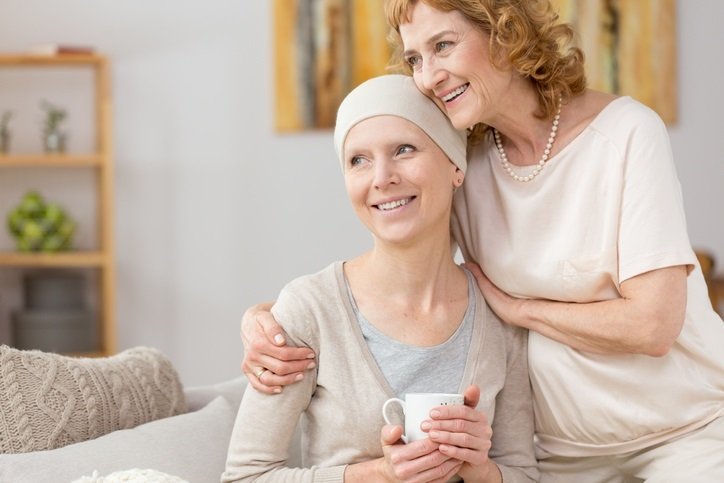
Insight By Cancer Treatment Centers Of America
What to expect when balancing the roles of a caregiver
More than 15 million adults are living with cancer in the United States today. For each patient, a caregiver is sharing in the cancer journey.

This content is provided by Cancer Treatment Centers of America
More than 15 million adults are living with cancer in the United States today. For each patient, a caregiver is sharing in the cancer journey.
Caring for a cancer patient is an important job that plays a fundamental role in that patient’s recovery. Being a caregiver comes with its own set of challenges. It’s a role for which most people feel unprepared. It takes time and understanding to adjust to the changes.
While worrying about their loved one’s health, caregivers are likely trying to balance the demands of their new responsibility with their obligations, such as family and work. A caregiver often wears many hats, including:
- Medical advocate, navigating the medical system, attending appointments and overseeing paperwork
- Nurse, taking care of the patient’s physical needs
- Counselor, providing emotional support
- Household manager, dealing with meals, laundry, paying bills and caring for children
- Wage earner, working to maintain income and health insurance
When you become a caregiver, you undergo a change in roles. Maybe you went from spouse to caregiver or from adult child to caregiver. Suddenly, you’re a nurse, counselor and medical advocate in addition to being a wife, husband, daughter or son.
This role shift may strain your relationship with your loved one. It can take time and understanding for both of you to adjust to this change and the new expectations it brings.
Caregiver burnout
Caring for someone with cancer can be physically and emotionally draining. Physically, you may experience fatigue, changes in appetite or problems sleeping. Emotionally, you may feel sad, anxious, guilty, angry, frustrated or helpless.
Too often, caregivers put their own needs aside to focus on their loved one’s needs. This may lead to caregiver burnout, which can express itself in as:
- Illness
- Increased anxiety
- Depression
- Irritability
- Social withdrawal
- Resentment
In spite of all the challenges, taking care of someone you love can be very rewarding. Caregiving can bring you closer to your loved one and strengthen your relationship. In the beginning, you may feel alone and unprepared for this new role. Yet, along the way, you may find forgiveness, strength, compassion and courage through caregiving.
Caregiver tips
More tips for caring for a loved one with cancer:
Educate yourself. Learn as much as possible about your loved one’s cancer type, treatment options and potential side effects. Ask your loved one’s doctor about patient education materials and supportive resources. The more you know about the disease and what to expect, the more confident you and your loved one will feel about treatment decisions.
Find a cancer team you trust. Find doctors who are experienced in your loved one’s form of cancer and who work as a team to provide individualized care. An integrative approach is also important to help your loved one manage side effects during treatment. Also, having your loved one’s doctors in the same location provides greater convenience and more streamlined care.
Stay organized. Keep a record of your loved one’s medical history, test results and medications. Also, write down appointments, physician names and contact information, including the pharmacy number. It also helps to make a list of your daily responsibilities and prioritize what needs to be done.
Keep your loved one’s doctors informed. Tell your loved one’s doctors about new symptoms they exhibit, such as changes in sleep, mood, bowel habits or appetite. These side effects may interrupt you’re loved one’s treatment and hinder his or her quality of life. Don’t wait for the next appointment to contact your loved one’s doctors about an important issue.
Follow your loved one’s lead. Don’t tell your loved one what to think or feel or how to act. Since you don’t know what your loved one is going through right now, let him or her take the lead. Instead of saying things like, “I know how you feel,” try saying, “I love you, and we’ll get through this together.”
Accept your loved one’s bad days. At times, your loved one may be depressed, angry or just having a bad day. It’s unrealistic to expect your loved one to “stay positive” all the time. And, putting these demands on him or her will only cause more frustration, guilt and stress. Accept the bad days, give your loved one space if needed, and try not to take things personally.
Take a break from cancer. It doesn’t always have to be about cancer. You and your loved one may need a break from cancer every once in a while. Try not to bring up the subject unless your loved one wants to talk about it. Instead, focus on other things, like spending time together doing something fun.
Remind your loved one that you care. Your loved one may need extra reassurance that he or she is still needed and loved. Find gifts that reflect who he or she is apart from cancer (e.g., books, art, music, tickets to an event). Let your loved one know that you still see him or her as a person, not as a cancer patient.
Grieve your losses. It’s normal to miss the life you and your loved one had before cancer. You may need some time to grieve your losses. Yet, try not to get caught up in focusing on the past and why this is happening to you. Instead, think about what you can do now. Take it one day at a time, understanding there will be both good and bad days.
Go easy on yourself. Caregivers often feel the need to do everything right. When you make mistakes, you may feel like you could have done something better. You may also feel guilty about being healthy. Try to let go of the guilt and don’t be too hard on yourself. Most of all, recognize that protecting your own health is essential to being a good caregiver.
Put family conflict aside. Sometimes hard feelings develop if one caregiver feels they are doing all the work and other family members aren’t chipping in. Everyone reacts differently in this type of situation. Try to be patient with other family members; they are probably doing the best they can. Don’t try to solve underlying issues/conflicts while your loved one is struggling to get better. Try to focus on what is most important at this time.
Prioritize responsibilities. It helps to make a list of daily tasks and prioritize what needs to be done. Space out activities with short rest periods, and postpone small jobs. Remember that you don’t have to take over all your loved one’s responsibilities. Your loved one probably wants to feel as independent and in control as possible right now.
Make time for yourself. Caregiving can sometimes be isolating and lonely. You don’t have to feel guilty about needing some time for yourself. Your loved one may need the space, too. Start out with small increments of time for yourself each day. Take a walk, watch a movie, call a friend, read a book, get a massage, take a warm bath or listen to music. Even if it’s just for a few minutes, doing something you enjoy can help you feel refreshed.
Monitor your own health. Your health is just as important as your loved one’s is. Don’t ignore physical and emotional symptoms, such as loss of appetite, difficulty sleeping or difficulty concentrating. Stay on top of your doctor’s appointments and any medications you are taking. Make sure to get enough sleep, exercise regularly and eat well, all which may reduce irritability and fatigue. Also, try mind-body techniques, such as relaxation or deep breathing, to reduce stress.
Keep a journal. Many caregivers feel more emotional than usual as they try to cope with a loved one’s cancer. You may feel angry with the cancer itself, the situation, yourself, your loved one, other family members, doctors, etc. These feelings are all normal. It may help to keep a journal or write a letter to release your thoughts and feelings so you can better manage them.
Know your limitations. It’s common for caregivers to feel that they aren’t doing enough to help. Try not to take on more than you can handle. You may be struggling to balance your caregiving duties with your full-time job and other responsibilities. Look into the family medical leave policies at your workplace. Consult with your loved one’s doctor to determine if/when professional nursing services may be needed.
Accept help. Some caregivers think they are the only person who can do the job. Don’t be afraid to share the responsibility with others. When people offer to help, be specific about what you need done, such as cooking, cleaning, shopping, laundry, yard work, etc. If you need financial advice and assistance, contact your hospital social worker. Also, some websites provide calendars and other tools for coordinating help from others. Some resources available for caregivers of cancer patients include: The National Alliance for Caregiving, National Family Caregivers Association (NFCA) and Family Caregiver Alliance.
Stay connected. Staying connected with others may help you feel less alone and provide a much-needed emotional outlet. Share your feelings and concerns with family and friends. Join a caregiver support group, where you can talk about your experiences and trade advice. Online social networks may help you feel connected with others without having to leave home. You may also consider speaking with a professional counselor or spiritual leader.
NOTE: This information is not intended nor implied to be a substitute for professional medical advice. Always seek the advice of your physician or other qualified health provider prior to making decisions about your treatment.
Copyright © 2025 Federal News Network. All rights reserved. This website is not intended for users located within the European Economic Area.
Related Stories

Immigration courts miss a crucial metric for tracking immigrants



